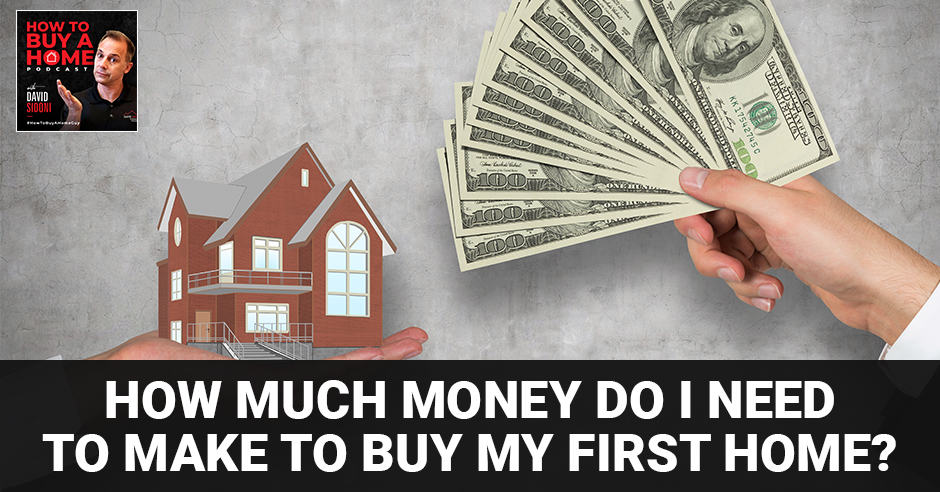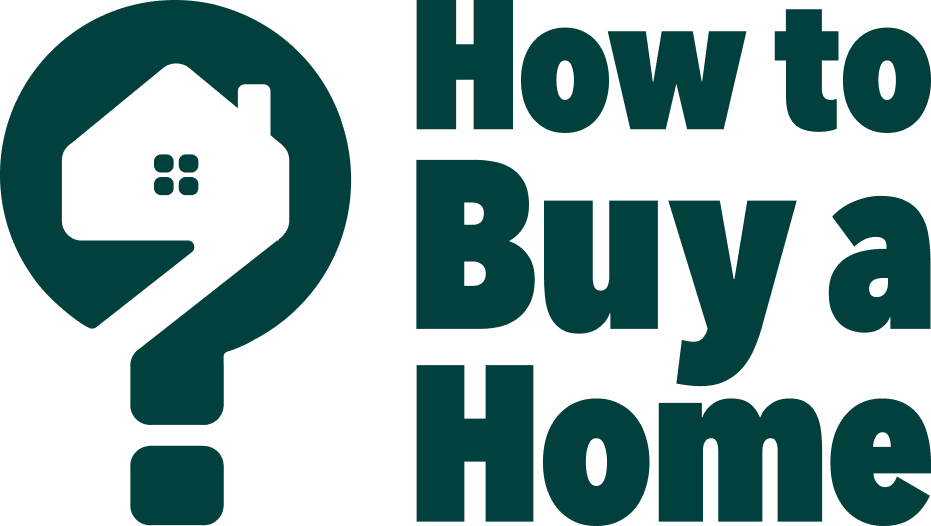
David gets into the details on the real numbers it takes to purchase and then pay for a home every month. With mortgage interest being so insanely low and low down payment options available to first time home buyers, buying your first house may actually be pretty similar to putting down a first and last and average rent payment on an apartment! Has anyone heard of P.I.T.I.? Get used to it as David helps in making this math and confusing terms easy to understand. Join us here and learn all the tedious but crucial formulas and acronyms you need to know when crunching your own personal numbers and find your path to homeownership without melting your brain.
—
How Much Money Do I Need To Make To Buy My First Home?
With Today’s Low Mortgage Rates, It’s Cheaper Than Ever To Own Instead Of Renting
If you’re asking yourself, “How much money do I actually need to make to buy a house? How much is my annual income? What’s that have to be?” If you’re asking yourself, “How much more is a house payment than my rent payment? Can I even do this?” good for you. Let’s find out together.
—
If you’re reading this sometime in the future, congratulations on making it to the future. Thanks so much for being here. This the show that helps you figure out how you buy a home, whether you’re three, four, five years out or three weeks away. We’re going to try to get you all the insights that you need. The main thing that we’re trying to do here, what I’m trying to help educate people is to let you know the secrets to turn your monthly bill, your largest monthly bill, that’s your rent, into your largest automatic wealth builder. You can probably do it a lot sooner than you think by turning you from a renter into a homeowner.
This show is dedicated to being the only place you can get yourself educated before you’re even close to buying a home and probably before you think you should even be thinking about it. If you do, you could save yourself tens and possibly hundreds of thousands of dollars. You can do it. Now, we’re going to get right into the meat of some nitty-gritty. I decided this information based on the news that came out on interest rates was really important. I wanted to get it out to you as quick as I can. It’s been a while that I’ve started this new venture where I’m giving back to everybody and trying to share this information through this show because I can get this nationwide to first-time buyers everywhere.
I’m trying to develop everything, my Twitter, my Facebook, my Instagram, my podcast, my LinkedIn and my YouTube all at the same time while I’m still helping people buy and sell houses and every once in a while, saying hi to my family. We’re going to talk about, “Can you afford to buy a home?” This is some important stuff because the numbers came out. Our interest rate, this is your mortgage interest rate, if you don’t know what that is, I’m really glad you found this show. Go back to the beginning and start reading. We’re going to talk you through all the basics.
Those of you who do know what’s going on with your mortgage interest rate, you’re probably paying big attention to it because my parents always talked to me about when rates were 18% and 19%. When I started in the business, people used to freak out about a rate that was below 6%. I’ve got them 5.9% and they just start doing backflips for me. We found out that the rates are hovering around 4.12%. A few years ago, we got crazy and gotten to the threes, but that’s insane. We are the lowest that we’ve been in a long time. Putting that in perspective, 2018 interest rates were at 4.6% pretty much the whole time. Where we are right now is at a low-cost of your money.
[bctt tweet=”I like the NFL and showtunes, and if you have a problem with that, I will fight you. But it will be West Side Story fighting with choreography and switchblades and a brilliant score.” via=”no”]
The bottom line is, stop looking at house prices and start educating yourself and talking to someone about what’s going on with the actual monthly payment. Can it go lower? I don’t know. The whole time I’ve been in the business, people have been talking about how ridiculous rates are low and that’s going back to the end of 2005. They should go up, but who knows. The projections right now are that we are going to get back above that 4.6% mark for the rest of 2019. That’s why I want to talk to you guys to say, if you think you’re close, then it’s probably good to get the ball rolling, get started and get out there. Talk to your realtor, talk to a lender. If you have questions about those things, you can always email or hit me up on Facebook or Instagram. I can point you in the right direction and talk to the right people and there are tons of other information in some of our other podcasts.
Let me give you the numbers. Let me give you some basic numbers on how much money does it take to buy a house? How much do I have to make? How much is my monthly payment? What does that monthly payment entail? I’m going to give you some average numbers. The thing about buying a house is everybody wants to tell you that they know exactly how it works. Let me tell you something unless you locked in a loan and bought a house yesterday, I’m not kidding, nobody’s information is current and up-to-date. Yes, a lot of things are similar. I always compare it to a pregnancy. Everybody likes to tell you about their pregnancy, but everybody’s pregnancy is different. There are even fewer things in common when it comes to buying a house because interest rates change daily throughout the day. That’s one part of what’s going on.
We’re also watching prices and everything else that goes on. This is based on an average individual with minimum consumer debt. That means you’re not maxed out to the hilt on all your credit cards. Don’t worry if you have a student loan because the student loans, it can be a hindrance to many buyers, but your monthly payment is what they’re looking at, not the gross total. I said gross total because it is pretty gross how much some of these student loans are. This is for an average person. I don’t mean an average personality. I’m talking about someone who’s looking at about a 22% tax bracket and a regular debt. I’ll get into that a little bit more as we go forward. I know we have people who read in some of the high priced areas. Let’s talk about how much it costs to buy a home for $109,000 and $486,000. Just to let you know that I’m very specific, this was an actual algorithm and formula that was created.
This was created based on a 4.75% interest rate because we made this just before we got the huge dip. If you want a $100,000 house, your estimated total payment is $838. That’s on a 3% down payment. That’s right around $3,000. $3,000 down, you can get $100,000 house and your payment is $838 a month. What does that payment include? Here comes your first real estate acronym. My favorite thing in the world, PITI. That’s your Principal and your Interest. That’s your mortgage payment. You pay the principal and interest on the loan and then your T is your Taxes, which again can be something that varies.

If your brother or your cousin or your friend bought a house and they said their taxes were X, your taxes might be X minus $300, $400 a year. In this particular scenario, the taxes are at $167 a month. The principal and interest $554, the taxes $167, the last I, PITI, for Insurance. You’ve got to have homeowner’s insurance. Remember this, if you’ve got a condo or a townhome, a lot of that insurance actually gets paid through your HOA fees. In this particular scenario, we’re looking at $67. Finally, your mortgage insurance. What’s mortgage insurance? We’re going to talk about that. To have the privilege of being able to buy a home for under 20% and in some cases under 10%, we can do 80-10-10 loans, but just know you don’t need to have full 20% down to not have mortgage insurance.
There are a lot of people that hate mortgage insurance. It’s a payment that you pay like your car insurance or your health insurance. It’s there to protect the bank in case you leave the house, can’t afford your payments anymore or need to get foreclosed on. The bank wants to make sure they get their money back. If you’re not going to put 20% down, which is the cushion they need, then they’re going to ask you to pay a monthly insurance premium. That’s MI, also known as PMI. What I tell people all the time is, “David, I’ve got the 3% down right now, but I don’t want to pay that stupid MI. I’m going to wait.” I’ll go, “How long did it take you to save that 3%? A year? Let’s do the math. If you’re taking and trying to save 3% of years, tried to get the extra 17% to get to 20% down so that you can avoid the MI.” Have I boggled your brain yet? Too many numbers too fast talking. People who hate MI says, “I’m going to wait until I can save 20%.” If you just let me take the imaginary whiteboard in your brain, I could draw out for you all of the pros and cons of that, all of the things that you would do while you’re waiting to save.
If you try to save that 17%, you could be paying yourself instead of paying your landlord. That could be $25,000 to $50,000 a year that you could be paying into your house which will eventually give you equity and be the largest part of probably your savings account. If it takes you two to three years, you’ve thrown a $150,000 of rent away as opposed to giving it to yourself. The numbers are really easy. MI is a privilege. It’s a privilege for you to be able to buy a house with 3% down. You’ve got to factor it in as one of your expenses. Let’s get to these breakdowns. A $100,000 house, your total payment is $838. That included PITI, Principal, Interest, Taxes and Insurance.
This is at 4.75% interest rate with a $3,000 down payment. On this particular scenario that we created for Joe and Jane buyer, the first timer family, we got their monthly obligations at about $400 in debt and that and the rest of their other monthly bills. It puts their DTI, Debt-To-Income ratio. It means how much money you make, pay your bills, tax your debt. All your bills, that’s your debt-to-income ratio. If we put it into percentage, I make a $1,000 a month. I’ve got $500 in bills. Your 50% DTI. On this one, the annual income you need is $30,000 to buy a $100,000 house, $400 in monthly obligations and your debt-to-income ratio is a little under 50%.
[bctt tweet=”Educate yourself before buying a home so you could save tens and possibly hundreds of thousands of dollars.” via=”no”]
If you want a home for $207,709, for that we are looking at an estimated payment of $1,456. Maybe you are looking at principal and interest on that one at $1,052, taxes at $250, insurance at $67 and mortgage insurance at $87. That’s your total at $1,456 a month. One of the things I didn’t mention on the last one was when you own a home, you get a gigantic tax-free. I’m throwing so many numbers at you right now. I’m not even going to get into the tax thing. You’ve got to trust me on this. I’ve sat with numerous first-time buyers. I have 79 first-time home buyers for David Sidoni and Associates and several more happening with other great realtors all over the country because I have been able to talk to people and help them figure out who to talk to in order to get their first home.
The biggest thing we tell people is, your deductions on your taxes, your W-2 or W-4, you fill one out and you get one on the mail. When you fill that out, the deductions most was between zero and one. You’re going to get a giant tax break and I will explain this way in detail later. You can increase your deductions and then increase your monthly paycheck. At the end of the year, you don’t have to pay anything extra because they are going to give you a big fat tax rebate because you are a homeowner, not a renter. If you are paying $1,400 right now, you can probably with the big tax break that you get afford $1,700, $1,800, $1,900 a month.
If you are paying a $1,000 a month, you might be able to afford this $1,456. A $200,000 at a 4.75% interest rate is going to cost you $1,500 a month. Your down payment is going to be $6,000. Your annual income should be $45,000. You can get a $200,000 home with an annual income of $45,000. Let’s move into $300,000. For those of you that are in the expensive areas, that may sound like a nice little condo to get you started and a townhome. $60,000 annual income, that’s what you need. Your estimated payment with the PITI and a little MI is $2,075. You can get a $300,000 house if you make $60,000 a year and you pay $2,000 a month in your payment. Your estimated down payment is $9,000. You will have some closing cost on top of that. We will talk about that in another episode.
One last thing, I forgot to mention this on the mortgage insurance. Don’t freak out about the mortgage insurance. Once your loan is actually down, the equity in your house has grown and then your loan that you currently have is 78% of the equity you have on the property, then your MI goes away. It doesn’t stay with you forever. Once the bank feels that cushion, at just over 20% cushion for them, they are going to drop that MI right off. What does that mean? You put 3% down right now. That means, you’ve got to get another 19% in appreciation or if you get a big inheritance, you pay it down and your MI goes away. $300,000, $60,000 income, $2,000 payment.
$401,207, full PITI is $2,598. If you are looking for a $400,000 house, it’s $2,600 a month. If you’ve got a $72,700 annual income. “What do I need, David?” There is the answer. $72,000 a year, $2,600 a month payment. If you are paying $2,200 or $2,100 with the tax benefits, you can probably easily afford $2,600 without feeling any change to your monthly bills. No FOMO for you. You will have to save your down payment of $12,000 and about $10,000 of closing cost. Getting to $500,000, you are going, “Sidoni, are you nuts? $500,000 is not a first-time buyer.” You must be one of my audience somewhere else in North America, not living in San Francisco, Los Angeles, Miami, Chicago, Dallas or New York City.
We’re looking at $504,138 and that’s going to cost you $3,106 a month and you need to be making $85,000. If you or if you and your partner or you and the partner that you would like to buy this home with, which can be your roommate or your friend or your buddy. We are talking about combined income at $85,000, your monthly payment is $3,106 for everything. Your down payment is about $25,000 on that. I don’t know why they did $25,000 there. That’s $4.96%. That’s a little higher than normal. Let’s call it 80-nish or 50-nish if we’re doing it at an exact 3%. It’s the same thing of about $10,000 cost there. I went super quick and rambled a whole bunch of numbers, but the bottom line is, if you are making and you have decent credit and not too much debt and you are making $60,000, you can get a $300,000 loan.
In fact, people are so excited. They are ringing my doorbell. With $60,000 a year, you can get a $300,000 home. $72,000 a year, you can get a $400,000 home and $85,000 a year, you can get a $500,000 home. Now, they are knocking at my door. Somebody is really excited about all these numbers. That’s the basic numbers to let you figure out if you want to buy a house. If you want to get deeper on some of the information, some of the whys behind buying a house, there is a ton of information in my first few episodes. If you want to get into some of the details about if you are getting closer, you want to interview a realtor, we’ve got a whole episode based on how to interview a realtor. There are a lot of misinformation out there. There are a lot of unfortunately green and novice agents that a lot of times get thrown to you, the buyer’s agent.
There is a whole episode about that. I really encourage you to read that before you go out and try to find an agent on your own. Also, I am helping people find agents who are buyer-focused with tons of experience. Someone who is going to save you hundreds of thousands of dollars and probably not lose your dream house or maybe tens of thousands for sure. We’ve got six folks that we’ve helped already all over the country from Hawaii to Atlanta to New York. Some folks in Los Angeles, a little farther North from me. In Denver, we got someone on escrow.
Most of them are starting their plan, but you can email me at [email protected]. You can hit me up on Instagram, @DavidSidoni. You can always put something down in the comments and the reviews which will be really great if you did subscribe to the podcast. This is a labor of love, a passion project for me trying to get this information out to everybody all around the country and in Canada as well. This is good information to help you figure out what you need to do. DavidSidoni.com is the website to find all the videos. Send your friends to the website. I am excited to have you here. Rate and review us. I do read everything that you guys write down. I got a review and someone said, “I want more content.” Is that enough content for you?
If you have questions and you’d like to know more about the actual process, if you are a closer, then the folks who are possibly two or three years out, tell me specifically what you like to hear. I’ve got a whole list of show ideas that we’re going to be doing as we move forward. Thanks so much to everybody. I hope that these numbers help you out. I hope that they encourage you. Don’t worry if you are out there and you are young, it probably means that you’ve got some upward mobility and you will be getting salary increases.
People are always excited when people are folks who have a plan and who are responsible. That doesn’t mean boring and stuffy, but if you’ve got a plan and you are one of those people that work that says, “Renting is an evil necessity, but it sucks,” and we shouldn’t have to do it especially when you see those numbers. If you are paying $1,500, $2,000, $2,500 a month, you could be in a condo that’s very similar to your apartment. Keep going. Keep plugging away. Call, text and email anytime with any questions and remember you can do this. I will talk to you next time.
Important Links:
- Facebook – How to Buy a Home Facebook Page
- [email protected]
- @DavidSidoni – Instagram
This podcast was started for YOU, to demystify things for first time home buyers, and help crush the confusion. After helping first timers for over 13 years, I knew there wasn’t t a lot of clear, tangible, useable information out there on the internet, so I started this podcast. Help me spread the word to other people just like you, dying for answers. Tell your friends, family, and perhaps that random neighbor you REALLY want to move out about How to Buy a Home! A really easy way is to hit the share button and text it to your friends. Go for it, help someone out. And if you’re not already a regular listener, subscribe and get constant updates on the market. If you are a regular and learned something, help me help others – give the show a quick review in Apple Podcasts or wherever you get your podcasts, or write a review on Spotify. Let’s change the way the real estate industry treats you first time buyers, one buyer at a time, starting with you – and make sure your favorite people don’t get screwed by going into this HUGE step blind and confused. Viva la Unicorn Revolution!
Instagram @DavidSidoni
Tik Tok @howtobuyahome

